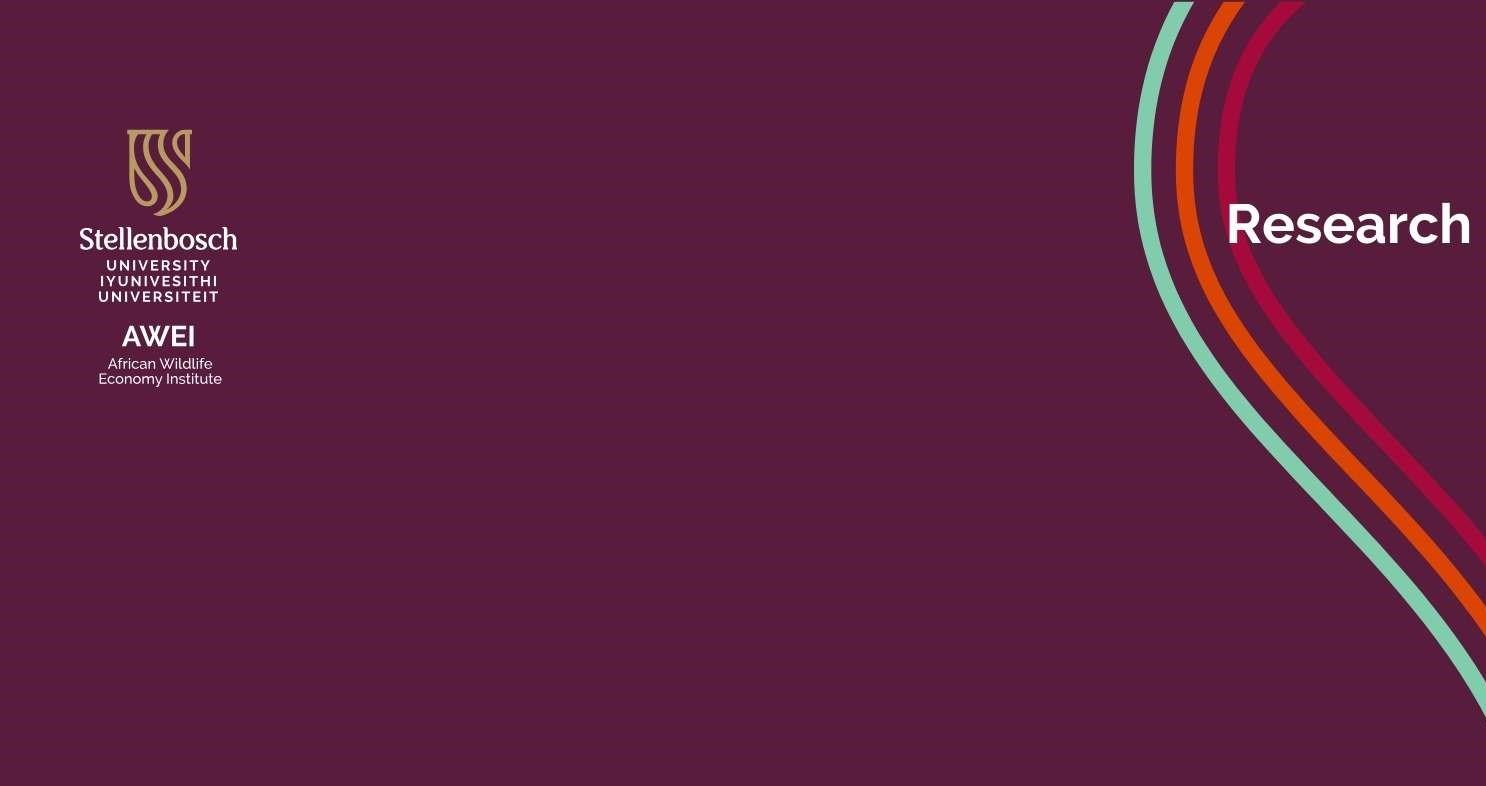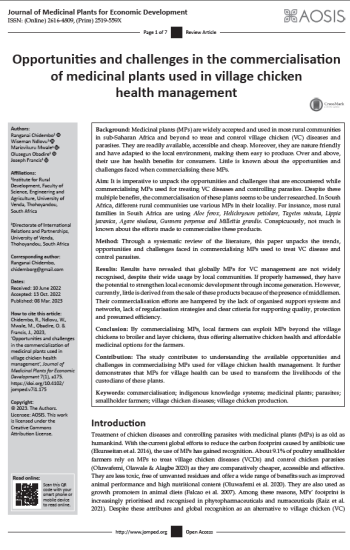

Opportunities and challenges in the commercialisation of medicinal plants used in village chicken health management
Background: Medicinal plants (MPs) are widely accepted and used in most rural communities in sub-Saharan Africa and beyond to treat and control village chicken (VC) diseases and parasites. They are readily available, accessible and cheap. Moreover, they are nature friendly and have adapted to the local environment, making them easy to produce. Over and above, their use has health benefits for consumers. Little is known about the opportunities and challenges faced when commercialising these MPs.
Aim: It is imperative to unpack the opportunities and challenges that are encountered while commercialising MPs used for treating VC diseases and controlling parasites. Despite these multiple benefits, the commercialisation of these plants seems to be under researched. In South Africa, different rural communities use various MPs in their locality. For instance, most rural families in South Africa are using Aloe ferox, Helichrysum petiolare, Tagetes minuta, Lippia javanica, Agave sisalana, Gunnera perpensa and Millettia grandis. Conspicuously, not much is known about the efforts made to commercialise these products.
Method: Through a systematic review of the literature, this paper unpacks the trends, opportunities and challenges faced in commercialising MPs used to treat VC disease and control parasites.
Results: Results have revealed that globally MPs for VC management are not widely recognised, despite their wide usage by local communities. If properly harnessed, they have the potential to strengthen local economic development through income generation. However, currently, little is derived from the sale of these products because of the presence of middlemen. Their commercialisation efforts are hampered by the lack of organised support systems and networks, lack of regularisation strategies and clear criteria for supporting quality, protection and presumed efficiency.
Conclusion: By commercialising MPs, local farmers can exploit MPs beyond the village chickens to broiler and layer chickens, thus offering alternative chicken health and affordable medicinal options for the farmers.
Contribution: The study contributes to understanding the available opportunities and challenges in commercialising MPs used for village chicken health management. It further demonstrates that MPs for village health can be used to transform the livelihoods of the custodians of these plants.
Chidembo, R., Ndlovu, W., Mwale, M., Obadire, O. & Francis, J., 2023, ‘Opportunities and challenges in the commercialisation of
medicinal plants used in village chicken health management’, Journal of Medicinal Plants for Economic Development 7(1), a175.
https://doi.org/10.4102/ jomped.v7i1.175
-

-
Joseph Francis
-
Marizvikuru Mwale
-
Olusegun Obadire
-
Ranganai Chidembo
We support the free flow of information. Please share:
More content
-

What Foot and Mouth Disease-free means for South Africa’s game meat trade
Ms Lydia Daring Bhebe…Explore the latest developments in South African provinces achieving and maintaining Foot and Mouth Disease (FMD) free status…
Articles -

The world wildlife trade regulator is 50 – here’s what has worked and what needs to change
Daniel Challender…Most countries implement Cites, the Convention on International Trade in Endangered Species of Wild Fauna and Flora as…Articles -

Enabling Sustainable Wildlife Trade
Prof Francis VorhiesEnabling sustainable wildlife trade is a key policy measure for growing Africa's wildlife economy. In this respect, CITES…
Articles -

Has CITES become too complicated to be effective?
Prof Francis VorhiesGovernments agreed to the text of CITES in the 1970s, which is quite straightforward. However, the agreement’s implementation…
Articles -

From poachers to providers: Can Africa's wild meat market save wildlife?
Dr Wiseman NdlovuHave you ever considered how wild meat could be more than just a cultural staple but also a…
Articles -

As a fellow of the African Wildlife Economy Institute (AWEI), I am excited to attend the upcoming 3rd…
Articles -

A theory of change to improve conservation outcomes through CITES
Dr Michael 't Sas-Rolfes…Here we articulate the implied theory of change (ToC) underpinning the design and operation of CITES (Convention on...
2025Research -

Wild Meat Value Chain Integration Systems: Opportunities for Value Chain Formalisation and Scaling in Africa
Dr Wiseman Ndlovu…Establishing a legal, safe and sustainable wild meat sector promises to potentially reduce demand for illegally sourced meat...
2025Research -

AWEI's 2024 Wildlife Economy Dialogue Series
Ms Emily TaylorRediscover 2024: A year of insight and inspiration
In 2024, AWEI proudly hosted three ground-breaking dialogue series in…
Articles
Get updates by email
Through impactful research, stakeholder engagement, and professional development, AWEI is supporting the wildlife economy across Africa. Please subscribe for occasional updates on our work and forthcoming events.
Sign up for a quarterly dose of AWEI insights
In a complex and changing world, AWEI generates strategic ideas, conducts independent analysis on wildlife economies, and collaborates with global scholar-practitioners to provide training and expertise for biodiversity conservation, climate resilience, and inclusive economic opportunities in Africa.
